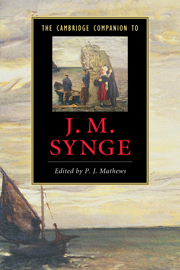Book contents
- Frontmatter
- Part 1 The Synge Texts
- 1 Re-thinking Synge
- 2 The Shadow of the Glen and Riders to the Sea
- 3 The Playboy of the Western World
- 4 The Well of the Saints and The Tinker’s Wedding
- 5 The Aran Islands and the travel essays
- 6 Deirdre of the Sorrows
- Part II Theorising Synge
- Part III Synge on stage
- Select bibliography
- Index
- Series List
3 - The Playboy of the Western World
from Part 1 - The Synge Texts
Published online by Cambridge University Press: 28 March 2010
- Frontmatter
- Part 1 The Synge Texts
- 1 Re-thinking Synge
- 2 The Shadow of the Glen and Riders to the Sea
- 3 The Playboy of the Western World
- 4 The Well of the Saints and The Tinker’s Wedding
- 5 The Aran Islands and the travel essays
- 6 Deirdre of the Sorrows
- Part II Theorising Synge
- Part III Synge on stage
- Select bibliography
- Index
- Series List
Summary
“'On Those That Hated The Playboy Of The Western World, 1907'” / “Once, when midnight smote the air, / Eunuchs ran through Hell and met / On every crowded street to stare / Upon great Juan riding by: / Even like these to rail and sweat / Staring upon his sinewy thigh.” W. B. Yeats. / In setting The Playboy of the Western World 'near a village, on a wild coast of Mayo' (CW IV, 55), Synge appeared to conform to the Literary Revival's preference for an idealised west-of-Ireland location, whose distance from the anglicised east had preserved Irish authenticity, and so enabled the embryonic nation-state to 'draw its vitality from that hidden spring'. However, while many of his contemporaries maintained a 'double focus on past and peasant', Synge's play was resolutely present-orientated. As signalled by the speculation that Christy had been 'fighting bloody wars for Kruger and the freedom of the Boers' (71), the world of Mayo might have been geographically distant from Dublin's Abbey Theatre in which the play was first performed on 26 January 1907, but they shared the same fraught historical moment. The Boer War ended in May 1902, but the well-known exploits of the Irish Transvaal Brigade raised by Major John MacBride to support the Boers' fight against the British Empire, and the pro-Boer enthusiasm of the future-founder of Sinn Féin, Arthur Griffith, and MacBride's wife-to-be, Maud Gonne, ensured that The Playboy's audiences would grasp that what was being staged was Ireland's recent and rebellious reality.
- Type
- Chapter
- Information
- The Cambridge Companion to J. M. Synge , pp. 28 - 40Publisher: Cambridge University PressPrint publication year: 2009
- 2
- Cited by



